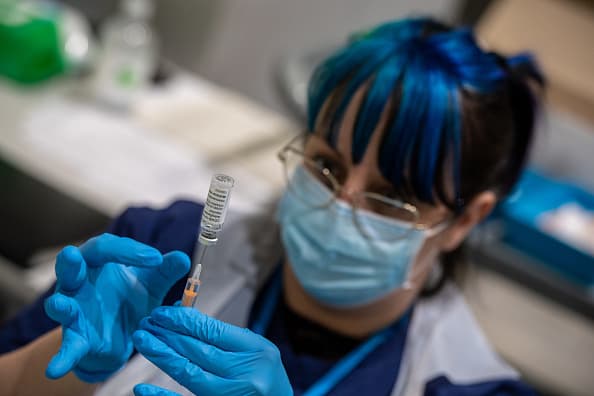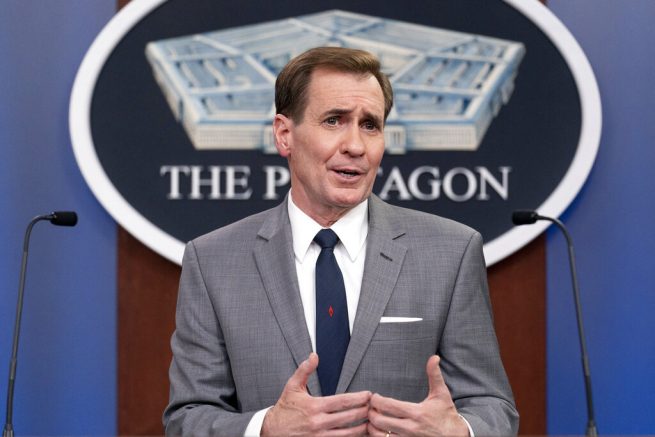
Covid vaccinator, Petra Moinar, prepares syringes with the AstraZeneca vaccine before it is administered at Battersea Arts Centre on March 8, 2021 in London, England.
Chris J Ratcliffe | Getty Images News | Getty Images
Heralded as “the vaccine for the world,” AstraZeneca’s Covid shot has been accompanied by high hopes ever since its inception. But unlike other coronavirus vaccines, the shot developed by AstraZeneca and the University of Oxford has been plagued by problem after problem.
AstraZeneca’s troubles started almost as soon as it published interim trial data and have continued ever since.
The drugmaker “seems to have a real PR problem on its hands in the U.S. and in Europe,” Sunaina Sinha Haldea, managing partner of Cebile Capital, told CNBC on Thursday, warning that its “public relations problem risks undermining confidence in the vaccine outside of the U.K.”
Here’s a timeline of all the problems that have struck AstraZeneca in the past year:
November 2020 – Trial data dispute
AstraZeneca published an interim analysis of clinical trials showing that its Covid vaccine had an average efficacy of 70% in protecting against the virus. The result was initially cheered by the global community, already buoyed by positive results for Moderna’s and Pfizer-BioNTech’s shots.
After further scrutiny, it became clear that the 70% figure came from combining the analyses of two separate dosing regimens within the trials. One dosing regimen showed an effectiveness of 90% when trial participants received a half dose, followed by a full dose at least one month apart. The other showed 62% efficacy when two full doses were given at least one month apart.
AstraZeneca admitted the half-dose regime was an error but described it as “useful mistake” and “serendipity.” It attracted criticism from U.S. experts, however, and AstraZeneca’s haphazard communication surrounding the mistake arguably marked the start of its reputational issues.
January 2021 – Supply dispute
In early January, the U.K. started to roll out the AstraZeneca-Oxford University vaccine. It had an added bonus for the country: the majority of its doses would be made in Britain.
However, it wasn’t long before an argument over supplies started brewing with the European Union, following reports that the drugmaker was not going to fulfil its contracted deliveries to the bloc.
A very public dispute over contracts ensued, starting a saga of acrimonious relations between the EU and both the U.K. and the Anglo-Swedish drugmaker. The EU made waves suggesting that AstraZeneca divert supplies to the bloc from the U.K.
January 2021 – Efficacy for over-65 dispute
Margaret Keenan, 90, is applauded by staff as she returns to her ward after becoming first patient in Britain to receive the Pfizer/BioNtech COVID-19 vaccine at University Hospital, at the start of the largest ever immunisation programme in the British history, in Coventry, Britain December 8, 2020.
Jacob King | Reuters
March 2021 – Blood clots dispute
Late March 2021 – U.S. data dispute
The woes for AstraZeneca have continued this week — despite it starting on a high note for the drugmaker. On Monday, the findings of a large U.S. trial showed that its vaccine was safe and highly effective, spurring hopes that it could soon seek U.S. clearance for the shot.
However, on Tuesday, a U.S. health agency said AstraZeneca may have included “outdated” information in the trial results, casting doubt over published efficacy rates.
AstraZeneca responded that the figures published Monday “were based on a pre-specified interim analysis with a data cut-off of 17 February” and said it would share its primary analysis with the most up-to-date efficacy data within 48 hours.
On Wednesday, it issued updated phase three trial data for its Covid-19 vaccine that showed its vaccine to be 76% effective — slightly lower than the 79% rate published on Monday.
What next for AstraZeneca?
The issues facing AstraZeneca could be set to continue, as EU leaders meet virtually on Thursday to discuss possible vaccine export bans that could hit the drugmaker. The EU and U.K. said Wednesday, however, that they wanted to find a “win-win” solution to the supply issue.
The negative coverage of AstraZeneca has led some onlookers (and certainly, the British media) to suggest that the vaccine has become a target for negative sentiment in Europe directed at the U.K. after Brexit. It has also been suggested that the shot could be the victim of vaccine nationalism in the U.S., where rival shots from Moderna and Pfizer–BioNTech originate (although BioNTech is a German company).
Whatever the underlying causes, AstraZeneca’s reputation has been sorely damaged.
As health-care analysts at Shore Capital said in a note Thursday: “Any confusion about results can be quickly amplified into concerns about the safety and efficacy of vaccines even when those concerns are not based on solid evidence.”
The AstraZeneca vaccine, they noted, “has been particularly hard hit by confusion around the data reported. Importantly, such confusion can lead to an erosion of trust in vaccines which are proven, life-saving medicines.”

